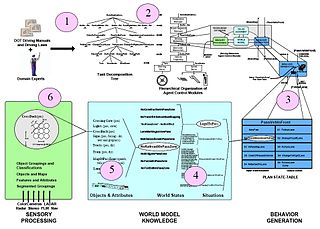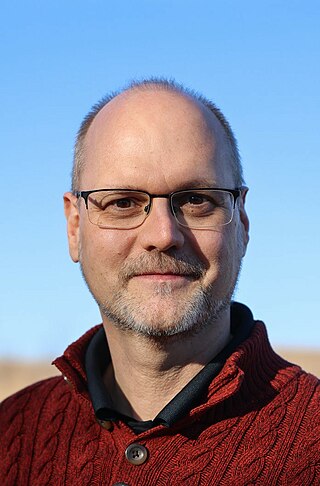Life
After reading Philosophy and Economics at St John's College, Oxford, Bench-Capon took the research degree of D. Phil at Oxford. He then worked in the policy and computer branches of the British Government's Department of Health and Social Security, after which he researched logic programming as applied to legislation at Imperial College London. Since 1987 he has been an academic in the Computer Science department of the University of Liverpool, first as lecturer, then from 1992 senior lecturer, from 1999 Reader, and from 2004 as Professor of Computer Science. [1] With Kevin D. Ashley and Giovanni Sartor he is an editor in chief of the Artificial Intelligence and Law Journal. [2]
Bench-Capon's interests are all aspects of advanced informatics systems, with a specialism in the application of such systems to law. [1] He has been called "one of the world's recognised experts on AI and the law". [3]
In 1975 Bench-Capon was a member of the St John's College University Challenge team, and in 1978 he married Priscilla Bradley, who had represented St Anne's in the competition earlier that year. Their sons James and Michael appeared in the University Challenge teams of Clare College, Cambridge, and Oriel College, Oxford, in 2002 and 2003 respectively. [4]

Cyc is a long-term artificial intelligence project that aims to assemble a comprehensive ontology and knowledge base that spans the basic concepts and rules about how the world works. Hoping to capture common sense knowledge, Cyc focuses on implicit knowledge that other AI platforms may take for granted. This is contrasted with facts one might find somewhere on the internet or retrieve via a search engine or Wikipedia. Cyc enables semantic reasoners to perform human-like reasoning and be less "brittle" when confronted with novel situations.
Knowledge representation and reasoning is the field of artificial intelligence (AI) dedicated to representing information about the world in a form that a computer system can use to solve complex tasks such as diagnosing a medical condition or having a dialog in a natural language. Knowledge representation incorporates findings from psychology about how humans solve problems and represent knowledge, in order to design formalisms that will make complex systems easier to design and build. Knowledge representation and reasoning also incorporates findings from logic to automate various kinds of reasoning.

Douglas Bruce Lenat was an American computer scientist and researcher in artificial intelligence who was the founder and CEO of Cycorp, Inc. in Austin, Texas.
John Florian Sowa is an American computer scientist, an expert in artificial intelligence and computer design, and the inventor of conceptual graphs.

In artificial intelligence and philosophy, case-based reasoning (CBR), broadly construed, is the process of solving new problems based on the solutions of similar past problems.
In philosophy, practical reason is the use of reason to decide how to act. It contrasts with theoretical reason, often called speculative reason, the use of reason to decide what to follow. For example, agents use practical reason to decide whether to build a telescope, but theoretical reason to decide which of two theories of light and optics is the best.

Robert Anthony Kowalski is an American-British logician and computer scientist, whose research is concerned with developing both human-oriented models of computing and computational models of human thinking. He has spent most of his career in the United Kingdom.
Legal informatics is an area within information science.
Patrick John Hayes FAAAI is a British computer scientist who lives and works in the United States. As of March 2006, he is a senior research scientist at the Institute for Human and Machine Cognition in Pensacola, Florida.
Douglas Neil Walton was a Canadian academic and author, known for his books and papers on argumentation, logical fallacies and informal logic. He was a Distinguished Research Fellow of the Centre for Research in Reasoning, Argumentation, and Rhetoric (CRRAR) at the University of Windsor, Ontario, Canada, and before that (2008–2014), he held the Assumption Chair of Argumentation Studies at the University of Windsor. Walton's work has been used to better prepare legal arguments and to help develop artificial intelligence.
Norms can be considered from different perspectives in artificial intelligence to create computers and computer software that are capable of intelligent behaviour.
HYPO is a computer program, an expert system, that models reasoning with cases and hypotheticals in the legal domain. It is the first of its kind and the most sophisticated of the case-based legal reasoners, which was designed by Ashley for his Ph.D dissertation in 1987 at the University of Massachusetts Amherst under the supervision of Rissland. HYPO's design represents a hybrid generalization/comparative evaluation method appropriate for a domain with a weak analytical theory and applies to tasks that rarely involve just one right answer. The domain covers US trade secret law, and is substantially a common law domain. Since Anglo-American common law operates under the doctrine of precedent, the definitive way of interpreting problems is of necessity and case-based. Thus, HYPO did not involve the analysis of a statute, as required by the Prolog program. Rissland and Ashley (1987) envisioned HYPO as employing the key tasks performed by lawyers when analyzing case law for precedence to generate arguments for the prosecution or the defence.
A legal expert system is a domain-specific expert system that uses artificial intelligence to emulate the decision-making abilities of a human expert in the field of law. Legal expert systems employ a rule base or knowledge base and an inference engine to accumulate, reference and produce expert knowledge on specific subjects within the legal domain.
Computational Law is the branch of legal informatics concerned with the automation of legal reasoning. What distinguishes Computational Law systems from other instances of legal technology is their autonomy, i.e. the ability to answer legal questions without additional input from human legal experts.

Knowledge acquisition is the process used to define the rules and ontologies required for a knowledge-based system. The phrase was first used in conjunction with expert systems to describe the initial tasks associated with developing an expert system, namely finding and interviewing domain experts and capturing their knowledge via rules, objects, and frame-based ontologies.

Danièle Bourcier is a French lawyer and essayist, who has contributed to the emergence of a new discipline in France: Law, Computing and linguistics.
Argument technology is a sub-field of collective intelligence and artificial intelligence that focuses on applying computational techniques to the creation, identification, analysis, navigation, evaluation and visualisation of arguments and debates.

Pascal Hitzler is a German American computer scientist specializing in Semantic Web and Artificial Intelligence. He is endowed Lloyd T. Smith Creativity in Engineering Chair, one of the Directors of the Institute for Digital Agriculture and Advanced Analytics (ID3A) and Director of the Center for Artificial Intelligence and Data Science (CAIDS) at Kansas State University, and the founding Editor-in-Chief of the Semantic Web journal and the IOS Press book series Studies on the Semantic Web.
Latifa Mohammed Al-Abdulkarim is a Saudi Arabian computer scientist and professor working on AI ethics, legal technology, and explainable AI. She is currently an assistant professor of computer science at King Saud University and visiting researcher in artificial intelligence and law at the University of Liverpool. Al-Abdulkarim has been recognized by Forbes as one of the “women defining the 21st century AI movement” and was selected as one of the 100 Brilliant Women in AI Ethics in 2020.
Katie Marie Atkinson is a professor of computer science and the Dean of the School of Electrical Engineering, Electronics and Computer Science at the University of Liverpool. She works on researching and building artificial intelligence tools to help judges and lawyers. Atkinson previously served as the President of the International Association for AI and Law.






